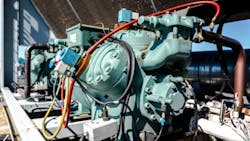Last November, I posted on refrigerant additives, particularly second-generation synthetic refrigeration additives (SRAs) that have largely replaced polarized refrigerant oil additives (PROAs). As I wrote, most, if not all, of the commercially available SRA products on the market today act as catalysts. That is, SRAs do not undergo any permanent chemical change as they go about reducing oil fouling on heat-transfer surfaces. Because I had first-hand knowledge of the performance of one of those products—Cold-Plus—I mentioned it by name. Not surprisingly, the first comment posted was an inquiry about a competitive product. The commenter asked if I had tried IceCOLD, which, the commenter said, is claimed to cut electricity costs by 15 percent to 35 percent, increase cooling capacity, extend compressor life, reduce maintenance costs, have a typical payback of six months to 18 months, and reduce carbon footprint.
IceCOLD “claims to be (a) liquid catalyst that is a blend of three synthetic components,” the commenter wrote.
My response was that I am very familiar with IceCOLD—it’s sold locally by a client of mine—and that I would have mentioned it in my post, but the maker, Efficiency Systems Ltd., doesn’t publish information about the composition of the product. According to IceCOLD’s material-safety data sheet (MSDS), it's a trade secret, a proprietary formula. Recently, I received comments by individuals very close to IceCOLD’s manufacture and distribution. They claim Cold-Plus, which I described as an SRA, one that is advertised as being “environmentally friendly,” is, in fact, a PROA because the insulating oil-fouling layer is replaced with another insulating layer of paraffin (wax) and contains a “confirmed carcinogen with experimental tumorigenic data.”
My degree is in electrical engineering, not chemistry, so I went to the developers of Cold-Plus for a response. What I learned is that a PROA works on weak magnetic attraction (van der Waals force), which causes the product to collect on the walls of coil tubes. Again, I’m not a chemist, but that fits with the PROA definition contained in the U.S. Department of Energy’s 1995 Federal Technology Alert referenced in my original post. Cold-Plus, its developers claim, has polymers that are permanently bonded to metal surfaces and are very efficient at heat transfer. They also pointed out there is no paraffin wax in Cold-Plus, explaining the heavy paraffin base oil is dewaxed with a solvent, which was confirmed by Cold-Plus’ MSDS, and they strongly maintained their product is not carcinogenic, a fact also confirmed by the MSDS.
To be fair, IceCOLD’s MSDS indicates it also is not a carcinogen. However, I have not had the opportunity to personally evaluate its performance, as, again, the lack of specific chemical identities in the MSDS makes a full evaluation of the product difficult. Perhaps Efficiency Systems Ltd., as well as other SRA providers, will choose to weigh in and keep the dialogue going so we all may be better informed about these products.
About the Author
Larry Clark
A member of HPAC Engineering’s Editorial Advisory Board, Lawrence (Larry) Clark, QCxP, GGP, LEED AP+, is principal of Sustainable Performance Solutions LLC, a South Florida-based engineering firm focused on energy and sustainability consulting. He has more than two dozen published articles on HVAC- and energy-related topics to his credit and frequently lectures on green-building best practices, central-energy-plant optimization, and demand-controlled ventilation.
